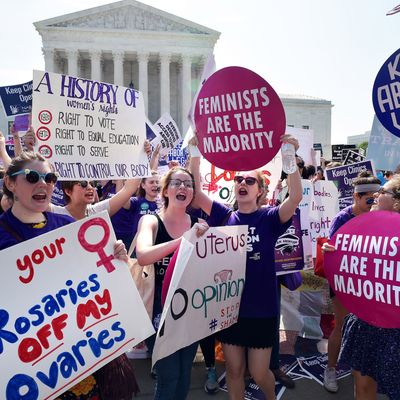
One of the great ironclad rules of U.S. public opinion is that attitudes toward the legality of abortion don’t change much over time. And even as the millennial generation came along and began significantly changing public opinion on many cultural issues (notably same-sex marriage and LGBTQ rights generally) the early readings were that young-uns were pretty much like their elders on abortion policy.
The evidence on that may now be changing. A new survey from Public Religion Research Institute shows increasingly sharp generational splits on all sorts of reproductive rights topics, along with indications that they are becoming more progressive on abortion policy over time. Here’s how PRRI summarizes its findings:
Just 44 percent of young Americans say abortion goes against their personal beliefs, compared to 60 percent of Americans over 65.
Nearly two-thirds (65 percent) of young people, compared to 51 percent of seniors, agree that abortion should be legal in most or all cases.
Nearly seven in ten (69 percent) young people, compared to 46 percent of seniors, agree that at least some health care professionals in their community should provide legal abortions.
And the polarization by generation may be getting more intense:
Approximately one-third of young Americans today say their views on abortion have changed in recent years. Nearly three times as many young Americans say they have become more supportive of abortion rights rather than more opposed (25 percent vs. nine percent).
Conversely, seniors (age 65 and up) are twice as likely to say they have become more opposed (12 percent) than more supportive (six percent).
These trends, if they persist, could also heighten the anti-abortion movement’s sense of urgency about completing its principal project, the reversal or significant curtailing of abortion rights by the U.S. Supreme Court. They are most likely within one SCOTUS Justice of making that a realistic prospect, and the three oldest Justices (Ginsburg, Kennedy, and Breyer) are all part of the fragile pro-choice majority on the Court.
Even if Roe v. Wade and a federal constitutional right to an abortion are overturned, the generational trend PRRI identified could be important as abortion law is determined in the crucible of each state’s political process. It will still involve a culture clash beyond anything we’ve seen since the civil rights era, but with momentum on the side of progress, however briefly thwarted.






























